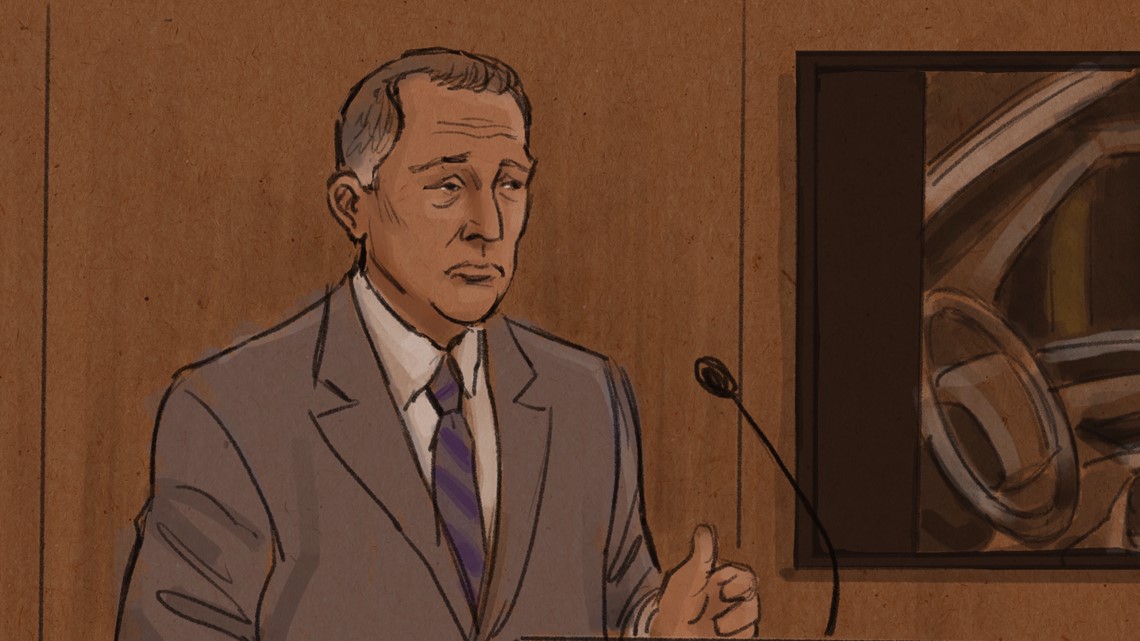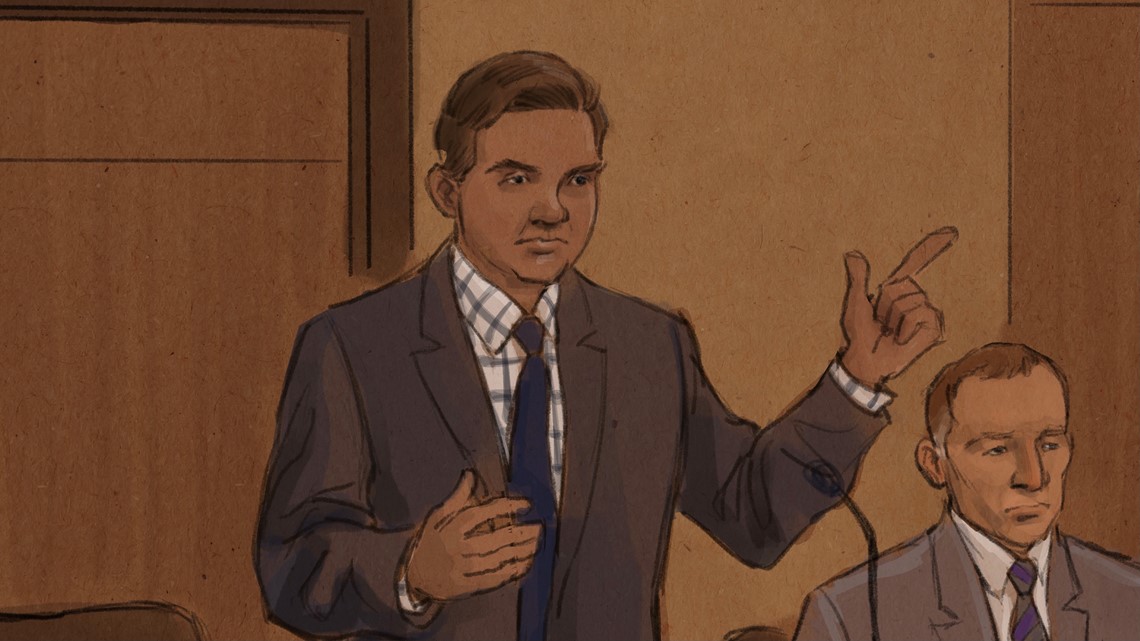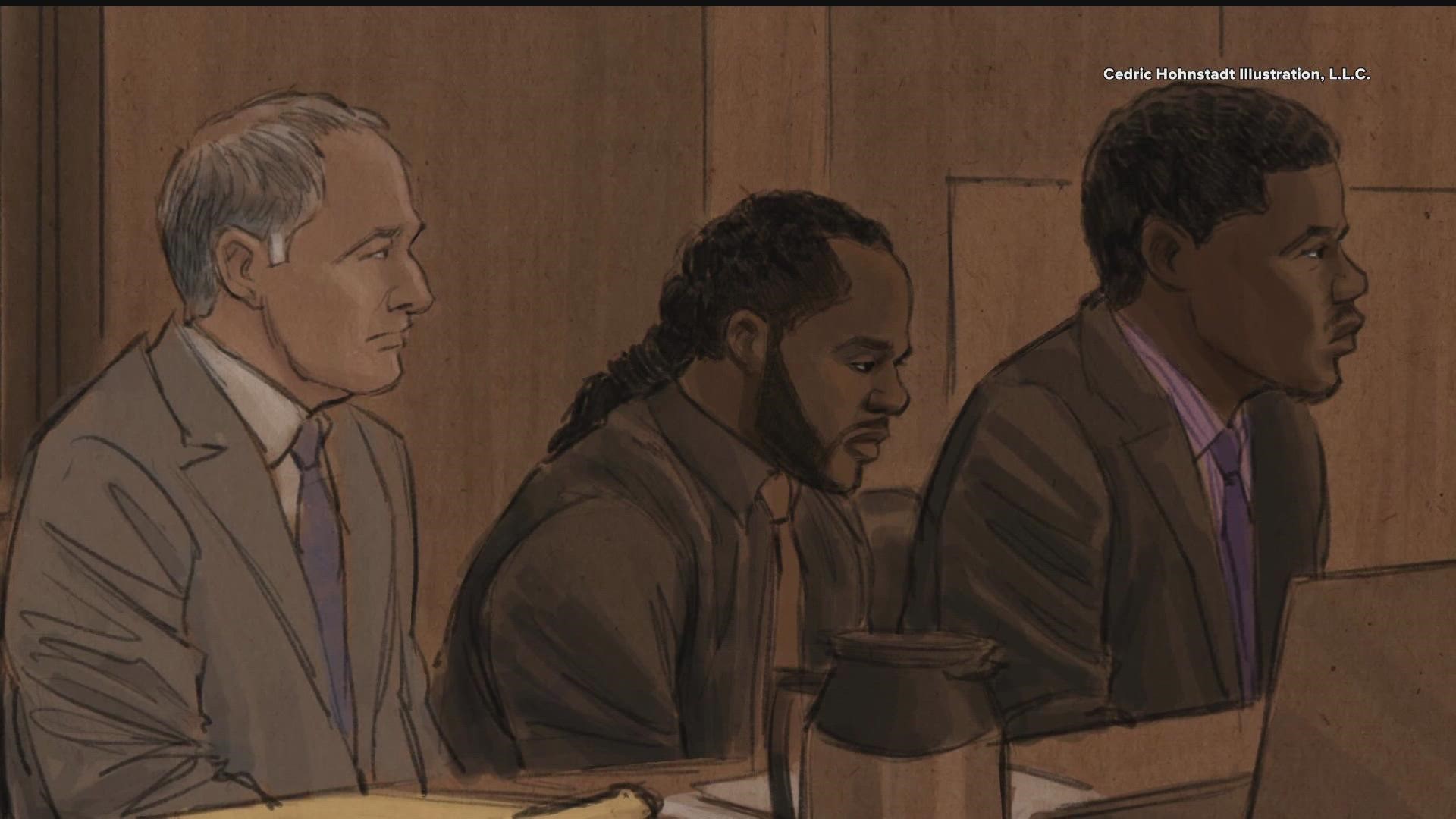MINNEAPOLIS — Jurors are back to deliberating Thursday in the trial of Jamal Smith, after the panel failed to reach a unanimous verdict in the second day of deliberations on Wednesday.
Smith is charged with first-degree murder, second-degree murder and illegal possession of a firearm in the shooting death of Jay Boughton on Highway 169 in July 2021.
KARE 11's Lou Raguse says the jury started deliberating Thursday morning at 9 a.m. sharp, and said the floor outside the courtroom was filled with supporters of Jay Boughton's family anxiously awaiting a verdict. At this time, Raguse says, there are no indications one is forthcoming.
On Wednesday afternoon, jurors told the judge they had made a decision on the counts of second-degree murder and illegal weapons possession, but were unable to reach consensus on the first-degree murder charge, and were uncertain whether continued debate would lead to a unanimous decision.
Judge Nicole Engisch told jurors to try again.
"That's not unusual or surprising ... bringing 12 minds together is difficult," Judge Engisch told the jury. "I'm going to ask you to continue to deliberate at this time."
Prosecutors and Smith's defense team delivered their closing arguments on Tuesday. The trial unfolded at a frenetic pace, with prosecutors calling 32 witnesses in just six days. The defense called just one, Smith himself, before resting its case Monday afternoon.
KARE 11's Lou Raguse was at the courthouse when about a half hour into Tuesday's deliberations, the jury paused to ask the judge a question. Raguse reported the jurors faced some confusion over the burden of proof in relation to the "aiding in the commission of the crime" portion of jury instructions.
Following a lengthy discussion between attorneys and Judge Engisch, Engisch told the court she would give them corrected instructions for aiding and abetting. According to Raguse, the defense tried to have Engisch dismiss the aiding portion of the charge, but she denied the request.
Closing arguments
The Defense: 12:45 p.m.
Jamal Smith's defense team opened its closing argument with a message for jurors on the video screen: it read "Equity under the law," and attorney Emmett Donnelly described how all people are created equal. He told the jury Smith comes from the other side of the tracks, and looking back on the videos and listening to the jailhouse phone calls Donnelly admits even he didn't like what he saw and heard. "But the personal attack is not evidence in this case."
The defense maintains that investigators in the case spent more time listening to taped phone calls than they did in the state of Illinois where Smith and his two companions fled after Boughton's death. Donnelly hammered at the prosecution's case, saying one star witness, Smith's girlfriend Rondelle Hardin, contributed nothing to the evidence as she was not there when the fatal shot was fired. He also downplayed evidence from the Hennepin County jail, where Smith allegedly tampered with witnesses and confessed murder to a deputy.
"To suggest he confessed a murder, that's exactly why this indicates they have zero evidence and zero proof that Mr. Smith did what they're accusing him of doing," Donnelly insisted. "Jamal Smith is not guilty, and the evidence, the actual evidence in this case, shows exactly why."
Donnelly returned to an image of passenger Brandon Smothers, holding onto a .45 caliber gun the day after Boughton was killed. He told jurors "even a junior high student" can tell it's the same gun Smith was seen waving around a day earlier. He zoomed in on the weapon, trying to raise doubt within the jury as to why someone besides the shooter would have possession of the murder weapon the day after the crime.
KARE 11's Lou Raguse says the image of Smother's with the gun, and the fact he is currently missing is the strongest element of the defense's case.
Donnelly closed by refuting the prosecution claim that Smith has been proven as the man who shot Jay Boughton. He told the courtroom that the state has no explanation or evidence as to what Jamal Smith actually did to aid in the commission of the crime.
“I'm asking you to look at the actual evidence. The evidence doesn’t lie. The evidence speaks," Donnelly maintained. "The evidence speaks that Jamal Smith is not the shooter.”


He pointed to the fact that Smith didn't have to testify in his own defense, but did, and he is the only person in the rented SUV at the time of the shooting who actually took the stand.
After a short redirect from prosecutors, the case went to the jury to begin deliberations at 12:30 p.m.
The Prosecution: 10:30 a.m.
Assistant Hennepin County Attorney Dan Allard began his closing argument by appealing to the emotions of jurors, attempting to tap into the human side of victim Jay Boughton. "There is something special about coaching a child in the sport they love." Allard told the panel that's exactly what Boughton was doing with his teenage son Harrison, driving home after a scheduled baseball game with no way of knowing the life-changing encounter that lay ahead.
Allard transitioned to evidence he insists proves that Boughton's death was an intentional act on the part of Jamal Smith. The prosecutor told jurors that while driving the rented SUV Smith slowed down, paced the coach's truck and pulled alongside, all of which Allard says can be seen on video.
"He then raised his gun, fired, and killed Mr. Boughton in front of his son," Allard insisted.
The prosecutor reminded the jury of the Facebook video Smith posted "glorifying the illegal possession of guns. He knew he couldn't legally possess them. But that didn't stop him." Allard added that being banned from having weapons didn't stop Smith from pointing a gun at motorist Danni Knight as the two men drove down I-90 in Wisconsin after Smith's tailgating prompted a brake check. The prosecutor says Knight tried to accelerate but Smith's vehicle was more powerful.


"Chases him down. Swerves around him and continues to point a gun at him. Now his two buddies are following their leader, Mr. Smith," Allard told jurors, "and they point their guns as well."
Allard says when Smith arrived at a Twin Cities animal hospital and finds Hardin is no longer there - despite having sat there all day, expecting Smith to arrive that morning and be with her - the defendant "knew he was in the doghouse" and started "driving like crazy" to get to her. Allard alleges Smith was doing 80 or 90 miles per hour, tailgating and swerving around other vehicles. "Unfortunately, Mr. Boughton is ahead of the defendant," he told jurors.
"When the defendant rears up behind him doing 80, 90, we don't even know how fast, for some reason he takes exception to Mr. Boughton... decides to engage...swerves over," Allard says. He reminds the jury Boughton's son Harrison testified that the SUV pulled into their lane, so his dad honked.
"Then he did exactly like many people do on the road. He extended the middle finger," Allard told jurors. "[Smith] couldn't handle it. He couldn't let go and he had to make a point. The point he made is "you will not disrespect me," rather than shouting or yelling or doing whatever people normally do."
The prosecutor says after the shooting Smith didn't call 911 or do anything to help Boughton, choosing instead to drive to his girlfriend's residence, have dinner and go out partying.
When laying out the elements needed for a conviction, Allard told the jury panel Smith admitted on the stand to possessing a gun he was prohibited from owning. He then made what KARE 11's Lou Raguse calls the strongest argument to support Smith as a murderer.
"When someone has a road rage incident, who is the person who gets pissed off? Is it the passenger? Of course not. It's the driver," Allard insisted. The driver of the SUV was Jamal Smith.
Allard reminded jurors that Smith was seen on the Facebook video holding a .45 caliber weapon, the same caliber that killed Boughton. He talked about gun shot residue and how most was found on the front passenger door where Smith was sitting, not the back door where Brandon Smothers was.
The prosecutor then brought up the defendant's jailhouse phone calls, during which jurors heard Smith try to convince people to delete his social media accounts and convince them to exercise their fifth amendment rights and not testify against him.
"Only someone with a guilty conscience, a guilty mind would take those steps, calls someone and says "avoid a subpoena,"" Allard told the courtroom.
When it comes to Smith's testimony, Allard told the jury they should believe "absolutely nothing he said," citing changing stories and the defendant's claim that someone else fired the fatal shot, and that he thought it was thunder.
"That gunshot would have been so loud within that truck that there is absolutely no way anyone could describe it as thunder," the prosecutor insisted. "No credible person could possibly confuse a gunshot with thunder. It's just ridiculous. Just another reason you can't believe anything he said."
If any juror thinks a passenger shot instead, Allard says the evidence shows Smith slowed down and "tracked" Jay Boughton's truck until the shot was fired, then drove off without stopping. "He's also the getaway driver. That's a classic example of aiding and abetting."
"The defendant lost his mind that day and killed an innocent man, father and husband, for no other reason than he felt disrespected because he was given the middle finger," Allard concluded, finishing the state's closing argument.
9 a.m.
KARE 11's Lou Raguse says before jurors entered the courtroom Tuesday, Hennepin County District Court Judge Nicole Engisch addressed Smith, explaining what prosecutors are seeking in terms of sentencing if he is found guilty. She told the defendant if he is found guilty of first-degree murder in Boughton's death he will serve an automatic life sentence without parole. If not, things get a bit more complicated.
If acquitted of count 1 (first-degree murder) but convicted of second-degree murder and being a felon in possession of a firearm, prosecutors are seeking an upward departure in state recommended sentencing guidelines. The state will need to prove a number of factors in a mini-trial. Among them:
- The defendant committed the crime in the presence of a child.
- His conduct created a greater than normal danger to the safety of other people on the roadway.
- This is Smith's 3rd violent crime and he is a dangerous offender.
Smith told Engisch he would prefer that she will decide if those factors exist, and not the 12-member jury that is currently deciding his guilt or innocence.
The jury was then led in to the courtroom, and Judge Engisch laid out their deliberation instructions.
Smith is charged with both first and second-degree murder in the death of Boughton, who was driving south on Highway 169 in Plymouth the night of July 6, 2021, when he was shot in the head/neck. Prosecutors say Smith was driving recklessly and took the fatal shot when Boughton flipped him off. Smith insists it was a passenger who fired on Boughton and killed him in front of his then-15-year-old son.
Watch more local news:
Watch the latest local news from the Twin Cities in our YouTube playlist:

